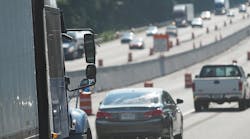It’s always important to drive safely, but with school back in session and the holidays just around the corner promising increased traffic, safe driving becomes even more critical.
Whether driving in the city, suburb or country, extra caution is needed when sharing the road with school buses.
Here are some tips for sharing the road safely:
- When to stop — It’s illegal to pass a stopped school bus on an undivided highway. You must stop when the school bus has its red lights on and its stop arm is extended.
- When to slow down — You must slow down when the school bus has its yellow lights on. It’s also a good idea to slow down whenever you see a school bus.
- Watch for children — Be especially vigilant in school zones, crosswalks and at bus stops. Children don’t always use crosswalks and may dart out into the street without looking.
- Limit distractions — Eating, fidgeting with the radio, talking on your cell phone all take your attention away from driving.
- Safety zones — Leave a minimum 10-foot safety zone for children in front of, behind and on either side of a school bus.
Driving in traffic requires extra attention and concentration as you are dealing with busy and sometimes narrow streets, preoccupied pedestrians and impaired visibility. You must stay alert, watch your speed and make turns carefully.
Here are some tips that will help with driving during these busy times and beyond:
- Keep your eyes moving — Don’t focus on one object, but rather look from one side of the road to the other. Try to scan a block or two ahead as well.
- Check your mirrors — Know what is behind you and on the sides of your vehicle.
- Watch taillights — Taillights allows you to track what is happening in front of you and give you some advanced warning when you need to stop.
- Watch for pedestrians and bicyclists — Be aware that pedestrians may dart out into traffic at any moment. Also, watch out for bicyclists that may pull up next to you in your blind spot.
- Watch for driveways, alleyways, parking lot access — Vehicles may come out of these places suddenly and won’t be visible until the last moment.
- Stay on specified routes — Follow assigned routes and don’t veer off from familiar roads.
In addition to these safe-driving practices, make sure your vehicle is well maintained so it will stop when it needs to.
Safe driving practices are always important but they become critical when during the school year, during holidays and at other times of increased traffic.



